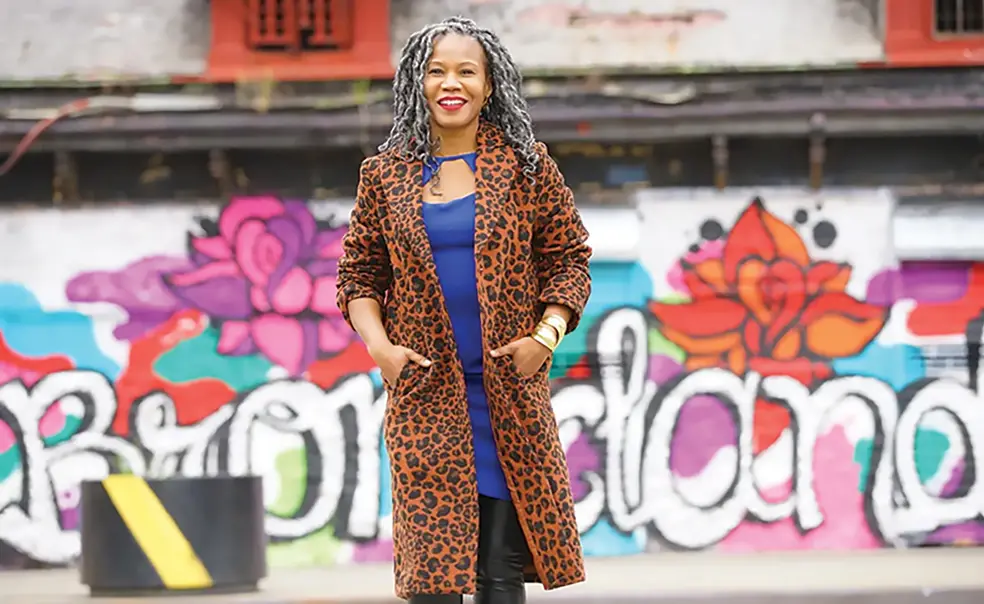Class Close Up: Uniting Students With Entrepreneurs in Trenton
Princeton students are collaborating with Trentonians this fall as part of a new Keller Center course that fights what visiting lecturer Majora Carter dubs the American brain drain in “low-status communities” — her term for neighborhoods where inequality is assumed.
In addition to being a MacArthur genius grant winner, Carter is a real-estate developer, environmental activist, and café owner, and she centers her work around economic development, particularly through local talent retention, and the policies and attitudes that work against communities like Trenton.
“These are not easy topics to understand and … to see and to feel, and to make that systemic bias not just something that you read on a page, but someone that you’re looking at,” said Carter.
Every Thursday morning, the 10 students in The Reclamation Studio: Humanistic Design Applied to Systemic Bias meet in the Friend Center to discuss themes from that week’s readings — including Carter’s own book, Reclaiming Your Community: You Don’t Have to Move Out of Your Neighborhood to Live in a Better One — which speak to the long history of systemic bias in community development.
After lunch, they return for studio time to collaborate with Trentonian social entrepreneurs on three specific projects, all with the aim of empowering the community.
“I really do think it’s a partnership between the students and [the entrepreneurs], trying to make sure that we understand what they do and why, and that we are here to figure out how do we support their efforts,” said Carter.
Sophia Vernon ’27, the only freshman in the class, is working with two other students and Trentonian entrepreneur Elijah Dixon on architectural plans, programming, and potential partnerships for The Enclave, a mixed-use building set to open in 2025 that they hope will become a social gathering spot.
Before she came to Princeton, Vernon wanted to go into nonprofit work, but that’s changed. She said this course has “really opened my eyes to the way that a lot of times nonprofits aren’t the most effective or correct way to make change, especially in low-status communities” because they tend to “reinforce the perspective that the community needs outside help to be better.”
Another group is working on relationship-building in tandem with the Smith Family Foundation for one of their programs that provides scholarships to local students in the hopes that after their college graduations, they will return to the area to take advantage of leadership opportunities. The third group is examining public contracts awarded by the city to determine if more funds can be reinvested into local businesses.












1 Response
Jon Carl Lewis ’87
2 Years AgoAdmiration, Support for Elijah Dixon and Trenton
I am so glad you featured the work of Elijah Dixon in Trenton, where I have lived with my husband since 2005. We are friendly with other Princetonians who love and support Trenton with time, talent, treasure — and residence! As former trustee and president of the I Am Trenton Community Foundation, we have been delighted to have supported Elijah’s work (financially and as cheerleaders) for almost a decade now. The I Am Trenton Community Foundation provides microgrants to Trenton entrepreneurs who bring the foundation their practical and very creative dreams to make their neighborhoods better places to live. In the decade-plus of our activities in Trenton, we have cultivated close connections with people making a positive difference in Trenton in all aspects of Trenton’s life. We have done this because we live, work, and play in Trenton. Although we welcome and are blessed by the contributions of others, most of our funds come from small donations, and most of our donations come from here. We’re a vibrant, diverse community, but it’s hard to see that as a tourist.
We who love Trenton and Princeton both are thrilled to see Princeton in the Nation’s Service in Trenton. I must thank Princeton alum Marty Johnson ’81 for his decades of work supporting our community through providing opportunities for youth. And, of course, we are happy for the helpful energies of Princeton’s vibrant, creative and intelligent students, staff, and faculty.
Many of us in Trenton are also vibrant, creative, and intelligent, and so we welcome partnerships that treat us as such, our home as such. It is not Trenton’s fault that the state occupies most of our taxable property, pays no taxes, and complains when Trenton expects the necessary support to run a diverse city and educate and protect our children. If we are “low-status” it is because others have deemed us so and reinforced their opinions by starving us of resources and maligning the character of people who live here.
We flourish in spite of those who consider us “low-status.” Even if that’s how we are referred to in outdated, insensitive academic literature, it is not a nice thing to say to our face. And we are listening.
I celebrate and look forward to hearing more about partnerships between the people of Trenton (who bring their various resources) and the people of our neighboring towns and institutions (who bring their various resources). Welcome. Please come. And let us work together as persons who bear equally the image of the divine to make our world a better place to flourish for everybody.